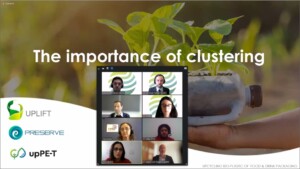
Screenshot of speakers (and moderators) during the workshop on “Upcycling bioplastics from food & drink packaging”, 20 October 2021 © PRESERVE, upPE-T, UPLIFT
On 20 October 2021, the EU projects PRESERVE, UPLIFT, and upPE-T held a joint workshop with around 160 participants to introduce their initiatives on upcycling bioplastics to a wider audience and to strengthen their collaboration and clustering efforts. The reason behind the event was that the initiators are convinced that this type of cooperation is essential to expand the European knowledge base for R&D projects. Ultimately, it facilitates the scale up of innovative bio-based technologies and leads to industrial deployment as well as to the provision of growth and jobs over the coming decades.
PRESERVE, UPLIFT, and upPE-T are three sibling projects that are aiming to transform food and drink packaging that currently cannot be recycled into new bio-based materials and products of better quality and with better environmental value. All three projects receive funding from the EU Horizon 2020 plan under the same topic call ‘Upcycling Bio Plastics of food and drinks packaging’ (CE-BIOTEC-09-2020). In total, the three projects comprise 58 partners from 19 European countries with a total budget of 23.3 million Euro.
During the workshop, Hasso von Pogrell, Managing Director of European Bioplastics e.V. (EUBP) and PRESERVE consortium member as well as Aleksandra Branković, Senior Researcher at IRI (Institute for Development and Innovation) in Serbia, gave an overview of the European bioplastics sector. In particular, they focused on the EU regulatory and legislative landscape that is shaping these innovation & research projects. During the second part of presentations, Cristiano Varrone, Associate Professor in Fermentation Technology at the department of chemistry and bioscience of Aalborg University and Project Coordinator of UPLIFT, Aldo Ramirez, Project Manager at IRIS Engineering and Project Coordinator at PRESERVE, as well as Fuensanta Monzó, Responsible for R&D projects at CETEC Technological Center of Footwear and Plastic of the Region of Murcia and Project Coordinator of upPE-T, introduced the three sibling projects, showcasing their objectives, methodologies, impacts, and expected results.
EUBP is involved in PRESERVE as consortium member responsible for communication & dissemination activities as well as for standardisation and legislation issues within the project. PRESERVE has the ambition to replace 60 % of food packaging currently used on the market with innovative bio-based packaging materials that can be upcycled into new products. The project partners are developing removable protein-based adhesives and coatings to reach the desired barrier properties of PLA (polylactic acids) and PHA (polyhydroxyalkanoates) materials for food packaging. A recycling pilot plant will be built to demonstrate the viability of a new delamination technology and feature sorting technology via advanced photonic and artificial intelligence. The recovered materials will then be used as secondary raw materials for non-food applications, such as upcycled textiles, durable reusable packaging materials, and personal care products, all with less than 15 % of virgin bio-based materials.
This kind of R&D and funding of R&D is critical for innovations and the transition to a circular bioeconomy. Yet, commercial exploitation depends not only on excellent research and collaboration, but also on having the right legal and regulatory framework to ensure fast introduction to industry and market. The current lack of coherence of funding and financing mechanisms for the circular bioeconomy delivers a deeply contradictory message to the partners involved in these projects and ultimately undermines the confidence and industry investment in the sector. The workshop participants and project partners agreed that better incentives for bio-based products in strategic sectors are needed to promote a stronger market uptake of sustainable products. This requires a framework that ensures a fair, predictable, and coherent basis for business to operate.
More information can be found on the PRESERVE project website.